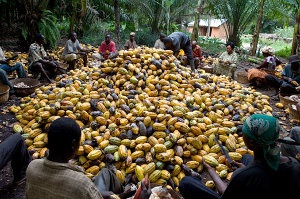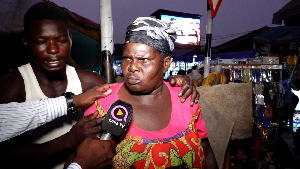The ECOM and Akuafo Adamfo Cocoa Sustainable Project has paid a total of GH¢979,008 to farmers in ten districts of the Central and Ashanti Regions as their first premium bonuses for the certified cocoa beans.
The ECOM cocoa sustainable project has a membership of 8,335 certified cocoa farmers in Asante Bekwai, Nsokote, Obuasi, New Edubeasi, Assin Breku, Assin Fosu, Breman Asikuma, Twifo Praso and Atieku.
They produced and sold 7,650 metric tonnes of exportable certified beans to ECOM through Akuafo Adamfo Marketing Limited.
Farming on approximately 57,142 acres of land, and with cocoa farms producing approximately 14,000 metric tonnes of certified beans, farmers underwent rigorous UTZ training conducted by Solidaridad West Africa to ensure deep understanding and adoption of the UTZ certification standard which is in its third phase.
These and more were made known during the premium launching ceremony by ECOM, Akuafo Adamfo and Solidaridad held last Monday at Bekwai in the Ashanti Region.
The project sought to reward its loyal farmers for their hard work, dedication and commitment to producing cocoa through good agronomic, environmental and social practices. The Project also seeks to provide farmers with the necessary training materials such as passbooks, training on health and safety procedures, and each farming community gets a first aid kit.
During the year farmers also received 15,000 shade-trees, with each district getting 1,500. A total of 4,500 cocoa-pods were also distributed to establish cocoa-seedling nurseries within ten communities.
The Managing Director of Akuafo Adamfo Marketing Limited, Antoine Boudib, said as the implementing partner of the project, his company is committed to ensuring a sustained market and competitive rewards for certified cocoa beans as they continue supporting farmers with the requisite skills.
On his part, the Managing Director of Solidaridad West Africa, Mr. Isaac Gyamfi, said his company values its participation in the project and remains committed to developing capacities of public and private sector institutions as well as farmer organisations to accept sustainable business solutions.
There has been a considerable demand for the supply of sustainable cocoa across the globe. Major chocolate manufactures, cocoa traders and processors have made huge commitments to source 100% certified cocoa by 2020.
In view of this, most of these companies have strategically partnered with development agencies and NGOs in various producer countries to implement sustainable cocoa projects that focus on supporting farmers to produce certified cocoa beans.
Many of these companies are committed to cocoa certification practices that embrace economic, social and environmental aspects of production.
To serve as a motivation for farmers to adopt sustainable production practices in the short- and medium-term, the cocoa traders pay a premium for certified cocoa.
The commitment of the global cocoa industry to a resilient supply was recently reinforced by a joint decision of 12 of the world’s largest chocolate and cocoa companies to implement a programe called “Cocoa Action”.
The Cocoa Action agenda seeks to collaborate with producer country governments, including Ghana, to embark on various long-term actions, projects, interventions and policies to transform cocoa production from the current low input use, low technology and poor farming practices with its attendant high transactional cost, to more technology and input-driven production approaches with support from policy institution reforms for a sustained commercial production.
Ghana is known to be the second-largest producer of cocoa in the world, supplying about 20% of the world’s cocoa.
However, the country’s annual cocoa yield of 400kg/ha is among the lowest in the world, and compares unfavourably to other leading producers such as Cote d’Ivoire (600-700kg/ha) and Indonesia (1200-1500 kg/ha).
Increasing yields at farm level is seen as a necessity in order to meet the increasing global demand for cocoa and improve the country’s competiveness in the global market place.
Intensified production efforts in Ghana can have the added benefits of increased access to jobs, competitive markets, and national revenue and export growth opportunities.
It is therefore argued that yield-increase with associated stable, remunerative pricing will lead to improved income for farmers.
Business News of Thursday, 21 August 2014
Source: B&FT













